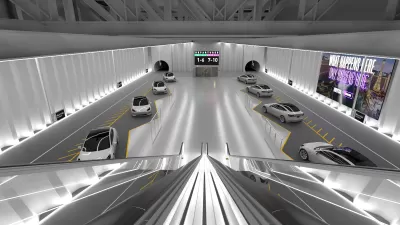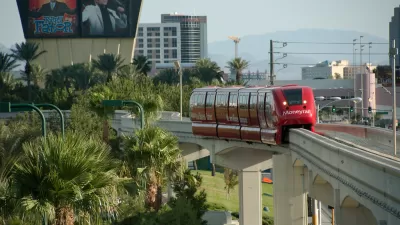It seems like the Las Vegas Convention and Visitor’s Authority expected trouble with The Boring Company, and built a contract that will impact Elon Musk's bottom line for falling short of agreed system capacity and construction timelines.

Mark Harris provides on an investigative report into shortcomings in the people mover planned by Elon Musk's The Boring Company (TBC) for the Las Vegas Convention Center (LVCC). Planning files reviewed by TechCrunch "seem to show that the Loop system will not be able to move anywhere near the number of people LVCC wants, and that TBC agreed to."
The LVCC wanted a system that could move up to 4,400 attendees every hour between exhibition halls and parking lots, according to Harris. But: "Fire regulations peg the occupant capacity in the load and unload zones of one of the Loop’s three stations at just 800 passengers an hour. If the other stations have similar limitations, the system might only be able to transport 1,200 people an hour — around a quarter of its promised capacity."
Failing to hit the targets laid out in the agreement would cost The Boring Company a lot of money—more than $13 million of the construction budget and millions more in penalties, reports Harris.
Harris provides more analysis of the project, as planned by The Boring Company, and notes that the LVCC anticipated the gamble it was taking on this untested application of Musk's ideas about transportation infrastructure. So when the Las Vegas Convention and Visitor’s Authority wrote its contract with The Boring Company, "it did its best to incentivize Musk to deliver on his promises," according to Harris.
Harris updates the expected timeline for the project, which was tied to payments, noting that one big milestone, the completion of the entire working system, already passed on October 1.
Previous Planetizen coverage of the Las Vegas Convention Center Loop project:
FULL STORY: Elon Musk’s Las Vegas Loop might only carry a fraction of the passengers it promised

Alabama: Trump Terminates Settlements for Black Communities Harmed By Raw Sewage
Trump deemed the landmark civil rights agreement “illegal DEI and environmental justice policy.”

Study: Maui’s Plan to Convert Vacation Rentals to Long-Term Housing Could Cause Nearly $1 Billion Economic Loss
The plan would reduce visitor accommodation by 25% resulting in 1,900 jobs lost.

Planetizen Federal Action Tracker
A weekly monitor of how Trump’s orders and actions are impacting planners and planning in America.

Wind Energy on the Rise Despite Federal Policy Reversal
The Trump administration is revoking federal support for renewable energy, but demand for new projects continues unabated.

Passengers Flock to Caltrain After Electrification
The new electric trains are running faster and more reliably, leading to strong ridership growth on the Bay Area rail system.

Texas Churches Rally Behind ‘Yes in God’s Back Yard’ Legislation
Religious leaders want the state to reduce zoning regulations to streamline leasing church-owned land to housing developers.
Urban Design for Planners 1: Software Tools
This six-course series explores essential urban design concepts using open source software and equips planners with the tools they need to participate fully in the urban design process.
Planning for Universal Design
Learn the tools for implementing Universal Design in planning regulations.
Caltrans
Smith Gee Studio
Institute for Housing and Urban Development Studies (IHS)
City of Grandview
Harvard GSD Executive Education
Toledo-Lucas County Plan Commissions
Salt Lake City
NYU Wagner Graduate School of Public Service





























